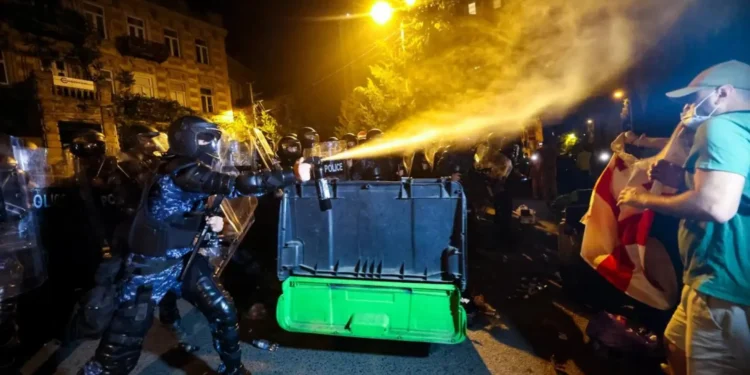Brussels (Brussels Morning) – The European Union denounces Georgia’s violent crackdown on protestors opposing the ‘Foreign Agents’ Bill, urging respect for peaceful assembly. Critics argue the bill is authoritarian and Russian-inspired, exacerbating tensions.
European Union have called for a suspension of escalating violence in Georgia after security forces employed water cannons, teargas, stun grenades and rubber bullets overnight to crack down on a peaceful rally against a “foreign influence” bill. The EU, which has given Georgia candidate status, on Wednesday “strongly condemned” the violence and called on the administration to respect the right of peaceful assembly.
Who Condemns the ‘Foreign Agents’ Bill in Georgia?
Josep Borrell expressed on X, “I strongly condemn the violence against protesters in Georgia who were peacefully demonstrating against the law on foreign influence. Georgia is an EU candidate country, I call on its authorities to ensure the right to peaceful assembly. Use of force to suppress it is unacceptable.”
The president of the EU Council, Charles Michel, has expressed that the bill – similar to a law used to crack down on dissent in Russia – “is not consistent with Georgia’s bid for EU membership” and would take Georgia “further away from the EU, not closer”.
Police confined 63 protesters in the capital, Tbilisi, and six officers were wounded, the country’s interior ministry expressed, as authorities sharply escalated their crackdown on the three-week-old protest action on Tuesday night.
What Does the ‘Foreign Agents’ Bill Enforce on NGOs?
Georgia’s opposition parties, the EU and the US have all condemned the bill, which would force NGOs, civil rights groups and media to report as “foreign agents” if more than 20% of their grant comes from abroad. They say it is authoritative and Russian-inspired.
The bill has exacerbated tensions in the polarised southern Caucasus country, putting the ruling Georgian Dream party against a largely youth-led protest campaign backed by opposition groups, civil society, celebrities and the president.
Parliamentary discussion on the bill, which requires three readings and a presidential signature to become law, persisted on Wednesday. Georgia, which lost a short war with Russia in 2008, has long sought to heighten its relations with the West and won candidate EU member standing in December, but critics say Georgian Dream is attempting to steer the former Soviet republic closer to Russia.
What Implications Does the Bill Have for Georgia’s EU Bid?
The head of EU enlargement negotiations, Gert Jan Koopman, was due to visit Georgia on Wednesday amid mounting crisis in EU capitals that the populist ruling party was actively aiming to undermine the country’s progress towards accession.
Georgia’s bid for membership of the European Union and NATO is glorified in its constitution and opinion polls indicate it is supported by more than 80% of the population. Brussels has declared Tbilisi must reform its judicial and electoral systems, decrease political polarisation, improve press freedom and shrink the power of oligarchs before formal accession talks can be launched.
Tina Khidasheli, a defence minister in a former Georgian Dream-led government, stated she expected the demonstrators to win eventually. “The government is just prolonging the inevitable. We might have serious problems, but at the end of the day, the people will go home with victory,” she told Reuters.




